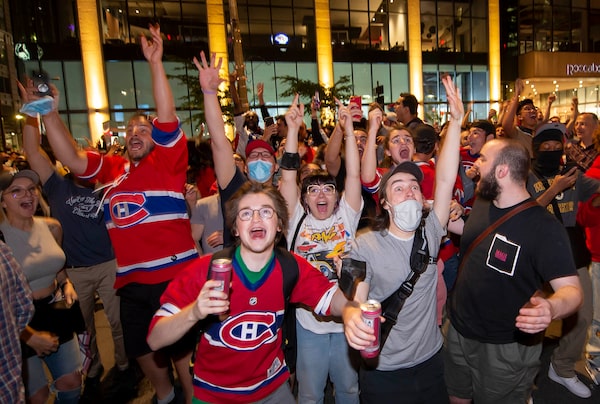
Montreal Canadiens fans celebrate on Rue Rene Levesque after the Canadiens defeated the Vegas Golden Knights to advance to the Stanley Cup final.Peter Mccabe/The Canadian Press
On May 17 at 7:03 a.m., Quebec experienced a minor 3.9 magnitude earthquake. In Montreal, it rumbled up the street like a dump truck and ended in seconds with a loud snap as the earth released pent-up energy. Not everyone felt and heard it and no damage was done.
On Thursday at 11:03 p.m., a louder rumble spread across the city as the Montreal Canadiens advanced to the Stanley Cup final for the first time in 28 years on a sudden-death overtime goal. In an era where hockey is consumed over airwaves and through wires, on radios, TVs, telephones and computers, the seismic wave was less synchronized than the earthquake but far more widespread and sustained. The tension release crackled.
At the corner of Mont-Royal Avenue and Berri Street, children in soccer jerseys brandished orange construction cones like Stanley Cup champions. Fans drove up and down the 31-kilometre length of Sherbrooke Street honking horns. In the quiet western suburb of Pierrefonds, fireworks went off and cries of joy poured from windows.
Downtown, people danced, shimmied up light poles and flipped a police car – and danced on it too – before police rained down teargas. Besides the car, police reported minor property damage, 15 arrests and 60 other municipal bylaw infractions, ranging from assault to illegally setting off fireworks.
No more excuses: Montreal’s postseason success is no accident
The Canadiens’ playoff run has the makings of movie magic
The wave of jubilation struck after hardworking Finnish forward Artturi Lehkonen scored in overtime on a pass from hardworking centre Philip Danault of Victoriaville, Que.
Hockey and the Montreal Canadiens are often described as the local religion and has produced other exultant rites of passage, but several extra factors made this a moment for the ages.
First, the pandemic: After nearly 16 months under various stages of lockdown, the city is coming to life. Then, the team: Almost no hockey experts and even few fans picked them to beat the Toronto Maple Leafs, and the Winnipeg Jets, and the Vegas Golden Knights. Then, the date: Thursday was Quebec’s Fête Nationale, the start of summer and a celebration of the province’s uniqueness, a day celebrated by Francophones across Canada as Saint-Jean-Baptiste Day.
The moon was also full.
“Happy Saint-Jean everyone, we are proud,” Mr. Danault said after the game in French, hamming it up by exaggerating the regional accent east of his hometown. “You knew something special was going to happen today, on Saint-Jean.”
The layers of special did not stop there.
The epicentre of hockey moments such as this are usually the rink. The Bell Centre can hold 21,302 fans but was limited to 3,500 to reduce the risk of COVID-19 spread. Those limitations, which the Canadiens are pushing to increase for the final, meant the main celebration was outside.
Jacob Armstrong, 19, was among the downtown revellers. He turned 18, Quebec’s legal drinking age, during the strict lockdown of the first COVID-19 wave. He turned 19 under Quebec’s 8 p.m. curfew. Thursday night was his first big adult night out, 399 days after he officially reached adulthood.
Mr. Armstrong started out in a bar but the allure of the street and collective celebration was too strong. He took in the game from restaurant TV screens and huddled around telephones with fellow fanatics.
When the overtime goal was scored, the restaurant TV screen he was watching flickered off, causing a moment of doubt before pandemonium. “Some people with a telephone were the ones who started screaming. We had no idea. Then the TV went on, back off, and on again, we saw the goal and started screaming,” Mr. Armstrong said. “It was a pretty crazy first night out with my friends.”
Cindy Lopez headed downtown for the end of the game, as she has for every pivotal moment in the playoffs. She’s watched the intensity build as doubters became believers. (She counts herself among them.)
“We’re all waking up as we slowly come out of the pandemic,” said Ms. Lopez, a photographer who became a Canadiens fan during the 1993 run, when she was in Grade 7. “This is just icing on the cake. This team has come out of nowhere and goes on this run that we didn’t even consider possible this year.”
One thing Ms. Lopez has noticed that seems to have changed over the years is the ubiquity of fireworks. Every lull in every game now features impromptu illicit fireworks shows.
Abdul Butt has watched the playoffs at home in the western suburb of Pierrefonds. Friends invited him out, but he didn’t want to change his pattern, partly out of superstition but also to make sure he could concentrate on the game.
When the Canadiens scored the overtime goal, he turned down the volume and savoured the sound of cheers, more fireworks and honking horns outside.
Mr. Butt, 35, got his love of hockey from his father, Ataf Butt, who was a field hockey fan in his native Pakistan but converted to ice hockey upon landing in Quebec. Abdul was struck by how the playoff run and Thursday’s victory have restored a sense of community after a year-and-a-half of intense isolation.
“It feels like for the first time since the pandemic people are coming together,”Mr. Butt said. “It feels nice that even at home, you can hear it outside and feel part of the community again.”
But Mr. Butt’s father, 72, doesn’t watch hockey as much as he used to. He recently had heart surgery. “The tension is too much and not good for his heart,” Mr. Butt said.
 Les Perreaux
Les Perreaux